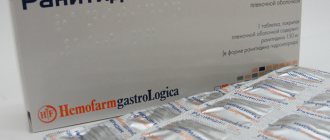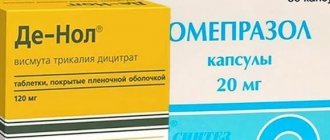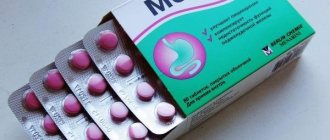Why are antibiotics needed for gastritis?
Antibiotics are drugs that are designed to fight bacteria that cause various diseases. If, during the examination, a high degree of contamination with the microorganism Helicobacter pylori was revealed in the patient, during an endoscopic examination the doctor sees foci of erosion or atrophy, and the patient himself is bothered by a number of severe symptoms, such as pain, heartburn or bowel dysfunction, then such a person should receive active therapy, aimed at eliminating bacteria.
Antibiotics are drugs that are designed to fight bacteria that cause various diseases.
Treatment that includes specific antibiotics to eliminate the microorganism is called eradication. It involves taking various antibacterial drugs in combination with medications that restore damaged gastric mucosa and accelerate the regeneration of damaged areas.
After a course of eradication therapy, the doctor assesses the patient’s condition and, if possible, conducts a laboratory analysis for the presence of the bacterium (while hoping for its absence). Further tactics will depend on the results. In any case, treatment of gastritis caused by the bacterium Helicobacter pylori is the task of doctors. Taking antibiotics on your own is highly undesirable and can lead to serious consequences.
Antibiotics in Helicobacter pylori eradication (treatment) regimens
The composition of eradication regimens, recommended antimicrobial agents, dosages and duration of therapy, see Standards for the diagnosis and treatment of acid-dependent and Helicobacter pylori-associated diseases (4th Moscow Agreement).
Examples of antimicrobial drugs included in Helicobacter pylori eradication regimens:
- macrolides: clarithromycin (trade names Klacid, Fromilid, Ecositrin), azithromycin (Sumamed), josamycin (Vilprafen), roxithromycin (Rulid);
- nitroimidazole derivatives: metronidazole (Trichopol, Flagyl), tinidazole;
- semisynthetic penicillins: amoxicillin (Flemoxin Solutab, Hiconcil);
- nitrofuran derivatives : furazolidone, nifuratel (Macmiror), nifuroxazide (Ersefuril;
- fluoroquinolones: levofloxacin (Tavanic), ciprofloxacin, moxifloxacin;
- semisynthetic derivatives of rifamycin: rifaximin (Alfa Normix), rifabutin;
- tetracycline.
In Helicobacter pylori eradication schemes, bismuth preparations are also used as an antimicrobial agent; in Russia, this is bismuth tripotassium dicitrate (De-Nol, Novobismol and others).
Side effects of antibiotics and rules for taking them
If the doctor chose the wrong course of treatment or the patient did not follow the instructions prescribed by the doctor, then negative side effects from antibacterial drugs are possible. Among which:
- discomfort in the abdominal area, accompanied by nausea and diarrhea;
- headache and dizziness;
- allergic reaction;
- psycho-emotional disorders.
When treating gastritis with antibiotics, a number of rules should be followed:
- The medication should be taken at the same time, without increasing or decreasing the intervals between procedures;
- Antibacterial therapy requires taking probiotics to prevent intestinal and stomach dysbiosis from developing;
- Take tablets or other oral medications only with water;
- diet is a prerequisite for antibacterial therapy;
- Treatment cannot be stopped even if the condition improves, otherwise bacteria not destroyed by the drug will attack the body again.
By following simple rules, you can cure gastritis.
Antibiotics for gastritis
Antibiotics for gastritis are prescribed if the cause of the disease is the bacteria Helicobacter Pilory. The only effective method for removing them is tablets for gastritis of the stomach. It should be noted that antibiotics are not a panacea for all ailments; they should be taken carefully and only as a treatment (and not as a preventive measure). All other types of gastritis that are not caused by bacteria do not require treatment with antibiotic medications.
Only a gastroenterologist can prescribe antibiotic therapy, based on test results, studies confirming the presence of Helicobacter pylori in the body; self-medication is not acceptable. It is necessary to take antibiotics for gastritis and stomach ulcers strictly as prescribed by a gastroenterologist. He can correctly calculate the appropriate dosage based on the patient’s weight, general condition, age, and the presence or absence of concomitant diseases.
Antibiotics for gastritis are prescribed if the cause of the disease is the bacteria Helicobacter pylori
The drug should be selected taking into account the characteristics of the patient’s body. Even if your condition improves, you should not stop taking it at your own request. You need to take the entire course prescribed by your doctor, otherwise there is a risk of the disease becoming chronic.
Antibiotics for gastritis have a powerful effect, cope well with bacteria, but also have a number of negative effects on the body. The main disadvantage of this group of drugs is the high risk of side effects and allergic reactions. The main manifestations include: stool disorder; stomach ache; nausea.
Names of the most effective antibiotics for gastritis:
- drug Clarithromycin: an antibacterial agent that is quickly absorbed and characterized by a long-lasting effect. Unlike its predecessor Erythromycin, it is more resistant to aggressive hydrochloric acid;
- Amoxicillin belongs to the class of penicillins: since it has a long period of elimination from the body, it must be taken no more than twice a day;
- the drug Metronidazole in combination with amoxicillin: shows its effectiveness in the treatment of Helicobacter for stomach ulcers. The action is aimed at destroying the DNA of enemy microorganisms;
- Tetracycline drug: has a detrimental effect on the protein synthesis of Helicobacter pylori cells, which leads to the death of the bacterium.
Treatment regimen for bacterial gastritis
There are many recipes from the arsenal of traditional medicine that fight Helicobacter pylori. But you must remember that they can only be used as an addition to the main course, but not in any way try to cure an ulcer with plantain and sea buckthorn oil.
A person who has cured gastrointestinal pathology using the traditional method can take herbal infusions for prevention. However, even in this case, it is advisable to consult a doctor about this. And, of course, you should adhere to proper nutrition.
In medical practice, several groups of drugs are traditionally used for bacterial gastritis:
- Clarithromycin (Binoclar and Klacid are its analogues);
- Omeprazole (Omez, Promez and others);
- Amoxicillin (Amoxil, Amoxicar).
To achieve a quick cure, these medications are combined with taking Metronidazole. That is, they take two antibacterial agents at once for gastritis caused by Helicobacter pylori. The pathogen is often resistant to antibiotics. Therefore, it is necessary to take funds from different groups to achieve the best result.
There are several treatment regimens for Helicobacter pylori infection. We strongly recommend that you entrust the selection of drug therapy to a doctor and not self-medicate.
Therapy
There is one two-stage treatment regimen for duodenal and gastric ulcers, which is aimed at eradicating Helicobacter and relieving symptoms:
- To begin with, the doctor prescribes two antibiotics, as well as a proton pump inhibitor. The combination of Clarithromycin and Metronidazole showed the greatest effectiveness in treating infection. The dosage is prescribed by the doctor, so we advise you not to choose your own therapy, but to see a specialist. The average dosage is 500 mg for an adult and 250 mg for a child. Typically, antibiotics need to be taken three times a day.
- After repeating the breath test - about a month later - Helicobacter pylori almost completely disappears from the patient’s body. To get rid of the remaining pathogenic microbes, complex antibacterial therapy is prescribed - Metronidazole in combination with Tetracycline. Also, the doctor does not forget about Ranitidine (a histamine receptor blocker) and a proton pump inhibitor.
Before prescribing a specific drug, the doctor finds out the sensitivity of the patient’s body to antibiotics. This will help you choose medications that will lead to the eradication of the pathogenic bacteria.
Treatment in difficult cases
Sometimes it happens that Helicobacter is too resistant. Here the treatment includes taking two antibiotics and an antiseptic. In this case, the accuracy of the dosage plays an important role, which depends on the patient’s age, weight and the presence of other diseases of the internal organs.
There is also quadruple therapy, which is used to treat gastritis if the previous regimen did not show adequate effectiveness upon re-examination. It is based on taking two antibiotics, proton pump inhibitors and a bismuth drug.
In addition to antibacterial and other drugs prescribed for ulcers and gastritis, the doctor selects a number of additional medications that speed up the patient’s recovery: antiemetics, antispasmodics and painkillers.
What antibiotics are taken for gastritis?
Which antibiotics to prescribe for gastritis is decided solely by a gastroenterologist. When people treat stomach inflammation on their own, they often cause serious harm to their health. In modern medical practice, two main treatment regimens for helicobacteriosis are used for gastritis. They are based on a combination of antibiotics such as Amoxicillin, Tetracycline, Clarithromycin and Metronidazole (Trichopol).
Among the reserve bactericidal agents for gastritis, Levofloxacin and Azithromycin (Sumamed) can be distinguished. The latter usually duplicates Clarithromycin in treatment regimens, especially when its administration provokes side effects. Levofloxacin is a new generation antibiotic. It is used to treat antibiotic-resistant strains of Helicobacter Pylori.
Special instructions for taking antibiotics for gastritis
Gastritis is treated with antibiotics only after consulting a gastroenterologist. The specialist will provide complete information about which diseases are contraindications to taking such medications.
They are not prescribed for individual intolerance, as well as during pregnancy and lactation. Caution should be observed in case of liver and kidney failure, in childhood and adolescence. During therapy, it is necessary to monitor the condition of internal organs: heart, kidneys, liver, stomach, as well as the blood system.
Side effects after taking antibiotics
If incorrect treatment of gastritis with antibiotics has been prescribed, the likelihood of improving health is reduced. Tetracycline is considered a dangerous drug. In case of negative effects, the patient will experience symptoms of nausea, diarrhea and abdominal discomfort. In individual cases, depression and gout can occur. After stopping taking intolerant medications, weakness goes away .
When antibiotic therapy ends, the intestinal microflora begins to restore. Side effects include:
- dysbacteriosis;
- headache;
- psychoemotional disorder;
- diarrhea and stool upset;
- allergy.
Regardless of the positive effect the medicine has on gastritis, the antibiotic affects the beneficial bacteria for the intestines. To restore the microflora of the stomach, preparations containing bifidobacteria and lactobacilli will help. Doctors recommend using these drugs in parallel with antibiotics.
The occurrence of side effects occurs due to an increase or decrease in the dosage of the drug. Such experiments can cause harm to the body.
Recovery depends on following the recommendations of the gastroenterologist. At the same time, it is necessary to follow a therapeutic diet for gastritis. It includes fermented milk products. If symptoms of side effects occur, you should consult a specialist.
How is gastritis treated with antibiotics?
Gastritis caused by Helicobacter pylori does not tolerate frivolous treatment, and traditional methods of treatment against it most likely will not work. To get rid of the disease, complete eradication (destruction) of pathogenic bacteria is required. This means that treatment of gastritis with antibiotics in this case is mandatory.
Moreover, the therapy includes two antimicrobial drugs, each of which is highly active against Helicobacter pylori. This is due to the fact that this microorganism is quite resistant to drugs. The choice of antibiotic for gastritis is always made by the doctor, based on the patient’s previous experience of taking drugs, the presence of contraindications, as well as the sensitivity of bacteria to certain substances.
Which antibiotics to prescribe for gastritis is decided exclusively by a gastroenterologist
The treatment regimen for Helicobacter pylori gastritis, recommended by the Scientific Society of Gastroenterologists of Russia, includes four components. This regimen is the most effective and allows for bacterial eradication with minimal toxicity and side effects.
The treatment regimen for gastritis with antibiotics includes:
- first antibiotic;
- second antibiotic;
- a drug that reduces the acidity of gastric contents;
- a bismuth preparation (De-Nol®), which has an antimicrobial and healing effect on the gastric mucosa.
Drug treatment of gastritis usually lasts from 7 to 14 days, depending on the degree of the disease and the individual characteristics of the patient. The duration of the course and the regimen of taking the drugs is determined by the doctor.
Treatment of gastritis of the stomach also involves a gentle diet, which excludes fatty, salty, spicy, fried foods and foods that negatively affect the acidity and gastric mucosa. You should also refrain from smoking, avoid alcohol completely, avoid the use of certain medications (including aspirin) and, if possible, reduce your stress levels.
Types of gastritis and its treatment with antibiotics
Gastritis can develop over many years and occur in a latent form for a long time. An acute attack can appear unexpectedly, and as a result of the examination, erosive gastritis or an ulcer without an inflammatory intermediate stage can be diagnosed.
In medicine, there is a classification of gastritis according to the presence of specific symptoms, the location of inflammation and the causes of this gastrointestinal disease. There are over 20 such types, but in a large-scale format two forms of gastritis can be distinguished:
- bacterial gastritis - the cause of its occurrence is the bacterium Helicobacter pylori, which can successfully develop in an acidic gastric environment and destroy the epithelial coating of the gastric walls. The longer the bacteria’s influence on the mucous membrane, the brighter the symptoms and the more critical the situation;
- autoimmune gastritis is an inflammation of the mucous membrane in the process of an attack by cells of the immune system on the epithelial surface of the stomach. The cells and glands of the stomach are gradually destroyed and do not synthesize hydrochloric acid in the required volume, and a failure occurs in the process of digesting food. This disorder leads to the formation of cancerous tumors in the stomach. This type of gastritis is diagnosed much less frequently and requires different treatment than bacterial gastritis.
Antibiotics for gastritis with Helicobacter pylori
The treatment regimen for Helicobacter pylori requires an integrated medical approach. Usually the patient is prescribed 2 drugs, which are selected individually. Plus, one drug from the group of proton pump inhibitors is mandatory.
The duration of treatment is determined by the gastroenterologist after a thorough examination of the patient and assessment of the severity of the disease. The duration of the course of therapy is 14-21 days. After its completion, the doctor conducts repeated laboratory tests to confirm the patient’s complete recovery.
Despite the fact that Helicobacter Pylori belongs to the group of pathogenic bacteria, not all antimicrobial drugs are able to destroy it. The microorganism quickly develops resistance to antibacterial substances, which significantly complicates the healing process.
Sometimes the doctor has to combine several medications at once to achieve positive dynamics.
Sometimes the doctor has to combine several medications at once in order to achieve positive dynamics; moreover, the acidic environment of the stomach can prevent the activation of drug components and slow down the therapy process.
The drug Amoxicillin and its analogue Flemoxin Solutab have the highest effect in the treatment of inflammation of the mucous membranes of the stomach and ulcers formed on it. It is possible to use other antibacterial drugs - Augmentin and Amoxiclav. They contain clavulanic acid, which prevents the production of specific enzymes by microorganisms. This, in turn, prevents H. pylori from developing resistance.
Antibiotic therapy for Helicobacter pylori infection involves the use of the following drugs:
- Clarithromycin;
- cephalosporin drugs;
- Azithromycin;
- Levofloxacin.
Types of antibiotics and compatibility with other drugs
Antibiotics that are used to treat pathology are divided into 3 groups:
- drugs based on omeprazole;
- clarithromycin;
- amoxicillin.
The difficulty of treatment lies in the increased acidity of the stomach, which prevents antibiotics from being as effective as possible. To destroy the bacteria, Metronidazole is taken along with the prescribed antimicrobial drug.
The usual regimen for treating gastritis is:
Taking three medications - two antibiotics (Metronidazole and Clarithromycin) and a proton pump inhibitor Omeprazole. This course of treatment is followed for about a week. If no effect is observed, then another treatment regimen is used:
For 10 days they take Clarithromycin, Amoxicillin, De-Nol. When this combination turns out to be ineffective, move on to the third treatment option:
They take 4 medications: Metronidazole, Amoxicillin, Tetracycline, De-Nol.
The most effective antibiotics for gastritis are:
- Amoxicillin is an antibiotic of the penicillin group. It comes in several forms - tablets or capsules. It can be replaced with drugs similar in composition and action: “Amosin”, “Flemoxin Solutab”, “Ecobol”, “Amoxil”, “Amoxillat”.
- "Clarithromycin" belongs to the macrolide series. Analogs: “Klabaks”, “Aziklar”, “Klareksid”, “Klatsid”, “Klamed”, “Klaritsid”, “Fromilid”, “Binoklar”.
- “Metronidazole” refers to drugs that block protein synthesis in bacteria, and this leads to a decrease in their activity and reproduction. Release form: tablets.
Less popular antibiotics that may be prescribed:
Sometimes drugs from the tetracycline series are prescribed. Azithromycin or Levofloxacin may also be prescribed.
Some of the popular prescribed medications for the treatment of gastritis can be considered in more detail.
"Amoxicillin"
This product is developed on the basis of penicillin; it destroys bacteria during their reproduction period. Amoxicillin is approved for children over 10 years of age.
- leukemia;
- bronchial asthma;
- mononucleosis;
- allergic conjunctivitis.
Also, this antibiotic can reduce the effect of contraceptives and enhance the effect of anticoagulants.
"Levofloxacin"
An effective antibiotic of the latest generation that neutralizes Helicobacter pylori in an aggressive environment, that is, it works with increased gastric secretion. The drug is prohibited for use by people with central nervous system diseases, pregnant and lactating women, and children.
"Azithromycin"
Azithromycin is prescribed when Clarithromycin is ineffective. The medicine causes almost no side effects. Release form: capsules, tablets, syrup. It is recommended to take the product one hour before eating or 2 hours after eating.
"Tetracycline"
This product inhibits the growth and reproduction of bacteria. Release form: tablets. Long-term use may affect the functioning of the kidneys and liver. When taking the medication, you should take multivitamins due to the fact that the drug reduces the absorption of vitamins K and B.
- autoimmune pathologies;
- renal and liver failure;
- fungal infections;
- decrease in leukocyte levels.
The drug is also prohibited for use by pregnant women, lactating women and children under 12 years of age.
"Omeprazole"
This is a drug taken to treat gastritis along with antibiotics. Omeprazole controls the secretion of gastric juice, thereby helping antimicrobial agents act more quickly on bacteria. The release form is capsules; the product begins to act an hour after administration and works for about 2 days.
The drug should not be taken by pregnant women, lactating women or children. Contraindications also include the presence of oncology. Analogues of the medicine are: “Gastrozol”, “Omez”, “Losek”.
Antibiotics for various forms of gastritis
In case of exacerbation of the disease, Amoxicillin and its analogues are prescribed together with Metronidazole. These drugs are prescribed for exacerbation of chronic gastritis.
For gastritis with high acidity, take Clarithromycin along with agents that inhibit the synthesis of hydrochloric acid.
“Clarithromycin” or “Amoxicillin” for gastritis is prescribed if gastric secretion is reduced, along with them “Acidin-pepsin”, “Pepsidil”, “Panzinorm” are taken.
Antibiotics for erosive gastritis
Antibiotics for erosive gastritis, acute and atrophic forms are indicated in most cases, since these are gastritis with high acidity, provoked by the activity of Helicobacter. A positive test for Helicobacter Pillory indicates that the stomach problems are quite serious. So much so that it will be necessary to treat the disease using a variety of different groups of drugs.
If we are talking about the destruction of Helicobacter, we talk about eradication therapy (eradication precisely means the complete destruction of this particular representative of pathogenic microorganisms living in the gastrointestinal tract).
There is a generally accepted scheme for the use of antibacterial drugs, which has proven its effectiveness. Due to the high resistance of H. Pillory, simultaneous use of two or three antibiotics is prescribed - this principle significantly increases the likelihood that the bacterium can be destroyed and addiction to a particular antibiotic will not occur.
What antibiotics should be taken for gastritis of the stomach is decided only by a gastroenterologist, and he has little choice:
- Metronidazole;
- Amoxicillin;
- Clarithromycin;
- Tetracycline.
Antibiotics for erosive gastritis in the acute and atrophic form are indicated in most cases.
If drugs from the group of antacids or proton pump inhibitors are taken for a sufficiently long time, throughout the entire course of treatment, then antibiotic therapy is prescribed for 7–10 days. No deviations from this period (neither less nor more) are acceptable - otherwise the effect of taking antibiotics will be zero. And one more nuance - Metronidazole is a first-wave drug, that is, it is customary to always include it in the treatment regimen.
The standard regimen for taking Metronidazole is twice a day at a dosage of 500 mg for a week. For 10-day therapy, 5 doses/day of 200 mg are prescribed. Clarithromycin dosage regimen: 2 tablets/day at a dosage of 250 mg. Duration of administration is the same as Metronidazole.
How to take Amoxicillin for gastritis usually does not cause any disagreement among specialists - this is a double dose of the drug in a “shock” dosage – 1000 mg. You need to take the tablets during meals. Tetracycline is prescribed twice a day at a dosage of 500 mg for seven days (or according to the 5/250/10 regimen).
Antibacterial agents for various forms of gastritis
If an exacerbation of the disease occurs, Amoxicillin and its substitutes are usually prescribed simultaneously with Metronidazole. These drugs are prescribed for chronic gastritis.
When a patient has a pathology with high acidity, Clarithromycin is used simultaneously with drugs that inhibit the production of hydrochloric acid. These drugs include Omez, Omeprazole, Ultop, Omefez.
For gastritis with low acidity, both Amoxicillin and Clarithromycin can be prescribed. Pepsidil, Acidin-pepsin or Panzinorm are taken simultaneously with these drugs.
All of the above drugs are used to treat gastritis in adults, except in cases with contraindications. In children, the disease is treated with Amoxicillin, since Clarithromycin, Tetracycline and Metronidazole are prohibited for patients under the age of twelve. Whether it is possible to give children other drugs, you need to find out from your doctor.
Gastritis after taking antibiotics
Gastritis after taking antibiotics according to one of the standard treatment regimens requires checking the result to ensure the complete absence of a pathogenic microbe. Repeated diagnosis is carried out two weeks after the end of the course of treatment of gastritis with antibacterial drugs.
Any medicine, in addition to having a positive effect on the stomach, has side effects. Therefore, the doctor may prescribe an examination not only of the gastrointestinal tract, but also of the heart, kidneys, liver, and general condition of the patient.
During treatment with antibiotics, not only the pathogenic microbe Helicobacter pylori is destroyed, but also beneficial bacteria. This deficiency needs to be eliminated and the functioning of the gastrointestinal tract should be adjusted in full with the help of probiotics and prebiotics. Their range is large, but which one to choose after treating gastritis with antibiotics, it is better to consult a gastroenterologist.
Any medicine, in addition to its positive effect on the stomach, has side effects
It is recommended to take drugs with bacteria beneficial to the intestines at the same time as starting antibiotics in order to eliminate adverse reactions from the gastrointestinal tract (constipation, diarrhea, flatulence, nausea). In addition to medications, a patient with signs of bacterial gastritis must follow a diet and daily routine. Milk is contraindicated during this period, but fermented milk products must be included in the assortment.
Dysbacteriosis during antibacterial therapy of gastritis
Regardless of the purpose and for what diseases antibiotics are prescribed, they simultaneously suppress the activity of “good” bacteria while affecting pathogenic microorganisms. Usually these are bifidobacteria and lactobacilli that live in the digestive tract. This phenomenon is called dysbiosis, and in many cases, an imbalance in the intestinal microflora is fraught with very unpleasant symptoms.
Therefore, antibiotics for ulcers and gastritis are prescribed with careful monitoring of the state of the intestinal microflora. When signs of dysbiosis are detected, and often simply for preventive purposes, along with antibiotics, medications are prescribed whose functions include restoring the normal state of the microflora and replenishing the deficiency with certain microorganisms. Among the most commonly prescribed probiotics are the following: Linex; Lactobacterin; Lacidophilus; Bifidumbacterin.
Sources:
- https://medaboutme.ru/zdorove/publikacii/stati/sovety_vracha/kogda_nuzhny_antibiotiki_pri_gastrite/?utm_source=copypaste&utm_medium=referral&utm_campaign=copypaste
- https://sovets.net/6516-antibiotiki-pri-gastrite.html
- https://antibiotic-info.ru/infektsii/gastrit/lechenie/
- https://gastritinform.ru/www.gastroscan.ru/handbook/121/5750
- https://zhkt.guru/gastrit/lechenie-5/lekarstvo/antibiotiki-2
- https://gastritinform.ru/gastryt.ru/gastrit/gastrit-helikobakter-pilori.html
- https://pobedigastrit.ru/lekarstva/kak-ispolzovat-antibiotiki-pri-gastrite.html
Antibiotics for intestinal infections for adults: list, dosage, method of administration
The most commonly used antibiotics for intestinal infections in adults:
Ceftriaxone is a powder used for the preparation of solutions and further intravenous or intramuscular administration (0.5 g per 2 ml or 1 g per 3.5 ml). Used for salmonellosis, typhoid fever and spirochetosis. Well tolerated, but may cause minor adverse reactions from the gastrointestinal tract - nausea, loose stools. Contraindicated in the first trimester of pregnancy. The daily dose is 20 mg-4 g/kg body weight, depending on the patient’s age and the severity of the disease. The injections are painful.
Ciprofloxacin is one of the most active fluoroquinolones, available in the form of a ready-made solution in vials for oral administration, as well as tablets and capsules. The action is directed against salmonella, shigella, campylobacter and other pathogens. The recommended dosage is from 0.125 to 0.75 g twice a day. Not for pregnant and lactating women, as well as children under 15 years of age. May cause increased sensitivity to sunlight (photosensitivity).
Levomycetin is effective against gram-positive and gram-negative bacteria. Dosage form – tablets and powders for the preparation of injection solutions. Helps with typhoid fever, paratyphoid fever, salmonellosis, shigellosis, peritonitis, yersiniosis. The average dosage in tablets is 250–500 mg three times a day; in injections – 500–1000 mg with the same frequency. Contraindicated in children under 3 years of age, pregnant and lactating women.
During pregnancy, patients are prescribed non-systemic antibiotics:
Alpha Normix - tablets based on rifaximin. Actively fights against various types of bacteria - Shigella, Proteus, Streptococcus, Clostridia. When taken internally, less than 1% is absorbed, so side effects are mild. Allowed for adults and children over 12 years old. Dosage – 1-2 tablets every 8 hours.
Amoxicillin is a bactericidal drug used for oral administration (tablets, capsules, solutions, suspensions) and injection (powder). The dosage is determined individually - from 0.125 to 0.5 g three times a day. Allergic reactions or the development of superinfections are possible.
Ceftidine is a powder for dilution and administration intravenously or intramuscularly. Effective on many strains of gram-positive and gram-negative bacteria. Can be used to treat newborn babies (30 mg/kg per day, divided into 2 doses). Adults are prescribed 1 g every 8 hours or 2 g twice a day.
The method of application is chosen taking into account the severity of the disease. In the early stages, preference is given to tablets, syrups and suspensions; in severe cases, intravenous and intramuscular injections are used.
The medication regimen (before, after, during meals) must comply with the instructions for the specific drug. Violating the dosage prescribed by the doctor is strictly prohibited.
It is important to adhere to a diet during antibiotic therapy:
- exclude sweet dishes that contribute to the development of pathogenic microflora;
- limit the consumption of fried and fatty foods, which put a lot of stress on the liver;
- do not consume foods with coarse dietary fiber, high acidity, or a high content of chemical additives, so as not to injure the mucous membranes of the gastrointestinal tract;
- do not drink alcohol, which weakens the immune system;
- give preference to fruits, vegetables, protein foods and dairy products - they will strengthen the body's defenses, replenish the supply of vitamins and improve digestion thanks to plant fiber and pectin.











